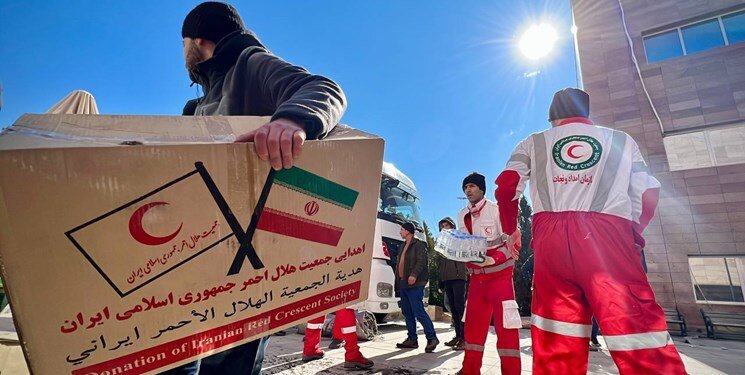Israel prevents Iranian humanitarian aid from reaching Gaza

TEHRAN- There are some reports confirming that Israeli authorities have asked Egyptian officials to refuse the 60 tons of humanitarian assistance that Iran had delivered to the Northeast African country to be sent to the beleaguered Gaza Strip via the Rafah border crossing.
Citing anonymous political sources, Lebanon’s Arabic-language al-Mayadeen television news network said that Egyptian officials had apologized to Iranians for preventing them from receiving any aid intended for the country because the Israeli regime would not permit it to cross the border.
On October 20, Iranian state-run media reported that food, medical supplies, and medications were included in the relief cargo.
In cooperation with the Iranian Red Crescent Society, Iranian aid was transported to Egypt from the Imam Khomeini Airport (IKA), which is located 30 kilometers (18.6 miles) southwest of Tehran, the capital of Iran.
Iran is prepared to provide relief supplies and humanitarian aid to Egypt in order to assist the people living in the Gaza Strip, as stated by Pir-Hossein Kolivand, the chairman of the IRCS, last week.
In a phone conversation with his Egyptian counterpart Rami al-Nazer, Kolivand emphasized the need of “continuing support for the oppressed people of Gaza” and reiterated Iran’s willingness to provide assistance supplies to the Palestinian enclave through Egypt.
Kolivand cited the lack of gasoline needed to run generators at Gaza’s hospitals and said that the Iranian Red Crescent Society is willing to provide the required fuel, highlighting the fact that this action would help the injured and address the medical facilities’ energy issues.
The second-largest hospital in Gaza, al-Quds, has stopped operating owing to a fuel shortage while Israeli troops continue to bombard the beleaguered territory, according to a statement released on Sunday by the Palestine Red Crescent Society (PRCS).
“The hospital has been left to fend for itself under ongoing Israeli bombardment, posing severe risks to the medical staff, patients and displaced civilians,” the PRCS said.
It added, “This cessation of services is due to the depletion of available fuel and power outage. Medical staff are making every effort to provide care to patients and the wounded, even resorting to unconventional medical methods amid dire humanitarian conditions and a shortage of medical supplies, food, and water.”
The PRCS also demanded accountability from the international community and Fourth Geneva Convention signatories for the total collapse of Gaza’s healthcare system and the ensuing horrendous humanitarian disaster.
Al-Quds Hospital has been isolated from the outside world for the past six to seven days, according to Tommaso Della Longa, a spokesman for the International Federation of Red Cross and Red Crescent Societies.
Ashraf al-Qudra, a spokesman for the Gaza Health Ministry, said that Israeli fire is “terrorizing medical officials and civilians alike.”
last Monday in a phone conversation between Iranian Foreign Minister Hossein Amir Abdollahian and his Egyptian counterpart Sameh Shoukry, they discussed the latest developments in Palestine.
Amir Abdollahian highlighted Iran’s and Egypt’s stances as two important Islamic countries, saying continuing bilateral talks is crucial in putting an end to the ongoing crisis in Palestine and the Israeli regime’s savage strikes against civilians in Gaza and the West Bank, according to the Iranian foreign ministry.
The Iranian foreign minister also noted that the summit of the Islamic countries in Riyadh was significant and signaled Tehran’s readiness to continue consultations with Cairo.
Amir Abdollahian asserted that the Iranian Red Crescent Society was ready to send humanitarian aid to Gaza through Egypt.
Meanwhile, the Egyptian foreign minister shed light on Egypt’s measures to send international humanitarian aid to the people in Gaza, and hailed the positions adopted by Arab and Islamic countries as well as those of the Islamic Republic of Iran and their efforts in this regard.
Shoukry also underlined the necessity of continuing bilateral and multilateral talks to help stop the conflict, establish a truce in Gaza, and send humanitarian aid to the people in the besieged enclave.
On October 7, following Hamas’s Operation Al-Aqsa Storm against the usurping entity, Israel launched its brutal war on Gaza which left thousands dead and injured.
Additionally, it has established a complete siege on the coastal sliver, depriving the more than two million Palestinian residents of their water, food, fuel, and power supplies.
Leave a Comment